Politics
Trump and Putin to spar Ukraine peace and arms control at Alaska summit
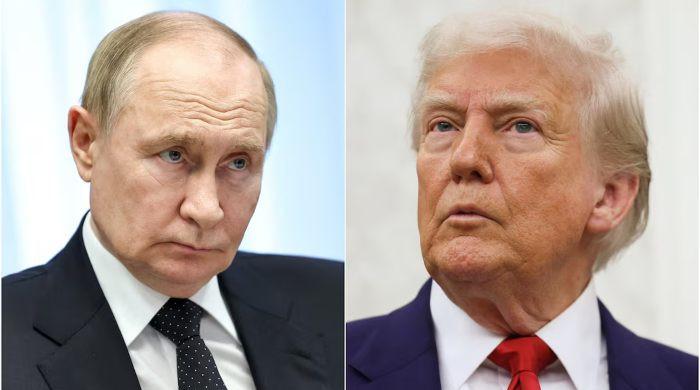
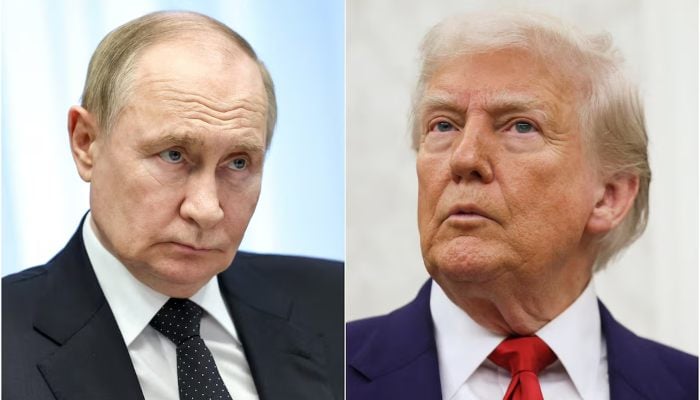
- Summit to take place at military base in Alaska.
- Trump says he thinks Putin will do a deal.
- Kremlin source says it looks as though terms will be agreed.
MOSCOW: Donald Trump and Vladimir Putin hold talks in Alaska on Friday, with the US president’s hopes of sealing a ceasefire agreement on Ukraine uncertain but with a last gasp offer from Putin of a possible nuclear deal that could help both men save face.
The meeting of the Russian and US leaders at a Cold War-era air force base in Alaska, their first face-to-face talks since Trump returned to the White House, comes amid Ukrainian and European fears that Trump might sell Kyiv out.
Trump, who once said he would end Russia’s war in Ukraine within 24 hours, said on Thursday the three-and-a-half-year conflict had proven a tougher nut to crack than he had thought.
He said if his talks with Putin went well, setting up a subsequent three-way summit with Ukrainian President Volodymyr Zelenskiy – who was not invited to Friday’s meeting – would be even more important than his encounter with Putin.
Trump is pressing for a truce to bolster his credentials as a global peacemaker worthy of the Nobel Peace Prize, something he has made clear is important to him.
Ukraine and its European allies were heartened by their conference call on Wednesday in which, they said, Trump agreed Ukraine must be involved in any talks about ceding land. Zelenskiy said Trump had also supported the idea of security guarantees in a post-war settlement, although the US president has made no public mention of them.
Wednesday’s call eased their fears of a Trump-Putin deal that would leave Ukraine under pressure to make territorial and other concessions.
Putin, whose war economy is showing signs of strain, needs Trump to help Russia break out of its straitjacket of ever-tightening Western sanctions, or at the very least not to hit Moscow with more sanctions, something Trump has threatened.
The day before the summit, the Kremlin leader held out the prospect of something else he knows Trump wants – a new nuclear arms control agreement to replace the last surviving one, which is due to expire in February next year.
Trump says Putin will do a deal on Ukraine
Trump said on the eve of the summit that he thought Putin would do a deal on Ukraine, but he has blown hot and cold on the chances of a breakthrough. Putin, meanwhile, praised what he called “sincere efforts” by the US to end the war.
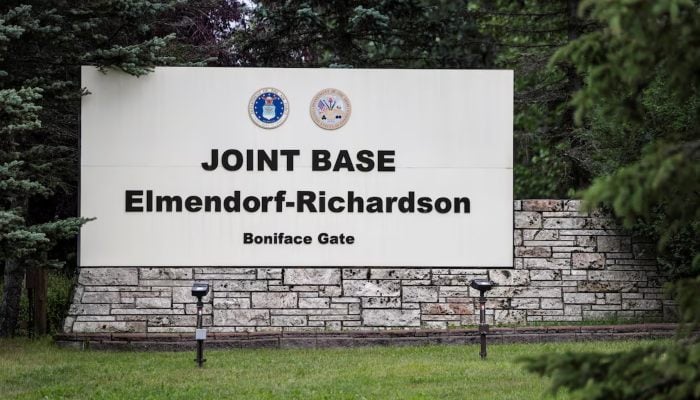
A source close to the Kremlin told Reuters it looked as if the two sides had been able to find some unspecified common ground beforehand.
“Apparently, some terms will be agreed upon tomorrow (Friday) because Trump cannot be refused, and we are not in a position to refuse (due to sanctions pressure),” said the source, who spoke on condition of anonymity because of the matter’s sensitivity.
Putin has set stringent conditions for a full ceasefire, but one compromise could be a phased truce in the air war, although both sides have accused the other of flouting a previous accord.
Analysts say Putin could try to look like he’s giving Trump what he wants while remaining free to escalate in Ukraine if he wants to.
“If they (the Russians) are able to put a deal on the table that creates some kind of a ceasefire but that leaves Russia in control of those escalatory dynamics, does not create any kind of genuine deterrence on the ground or in the skies over Ukraine… that would be a wonderful outcome from Putin’s perspective,” said Sam Greene, director of Democratic Resilience at the Center for European Policy Analysis.
Trump suggests land transfers will be needed
Zelenskiy has accused Putin of bluffing and playing for time to avoid US secondary sanctions and has ruled out handing Moscow any territory.
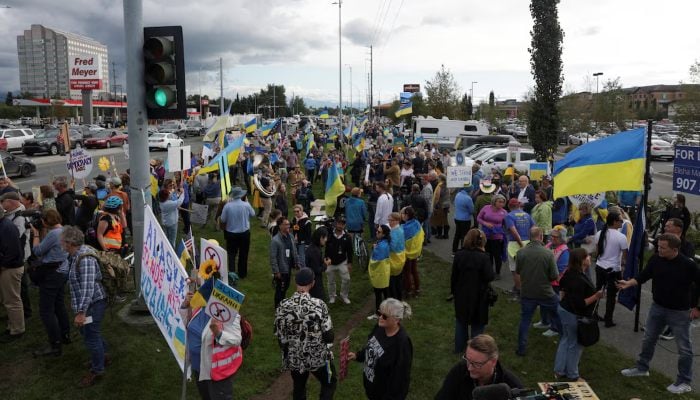
Trump has said land transfers between Russia and Ukraine could be a possible way of breaking the logjam.
Putin, whose forces control nearly one fifth of Ukraine, wants Trump to start reviving the two countries’ shrunken economic, political and business ties and, ideally, not to make that process contingent on progress on Ukraine.
But it is unclear whether Putin is willing to compromise on Ukraine. In power for a quarter of a century, the Kremlin chief has staked his legacy on coming out of the war with something he can sell to his people as a victory.
Chief among his war aims is complete Russian control over the Donbas industrial region in eastern Ukraine, which comprises the Donetsk and Luhansk regions. Despite steady advances, around 25% of Donetsk remains beyond Russian control.
Putin also wants full control of Ukraine’s Kherson and Zaporizhzhia regions; Nato membership to be taken off the table for Kyiv; and limits on the size of Ukraine’s armed forces.
Ukraine has said these terms are unacceptable and tantamount to asking it to capitulate.
Politics
Trump invites more leaders to join Gaza ‘Board of Peace’
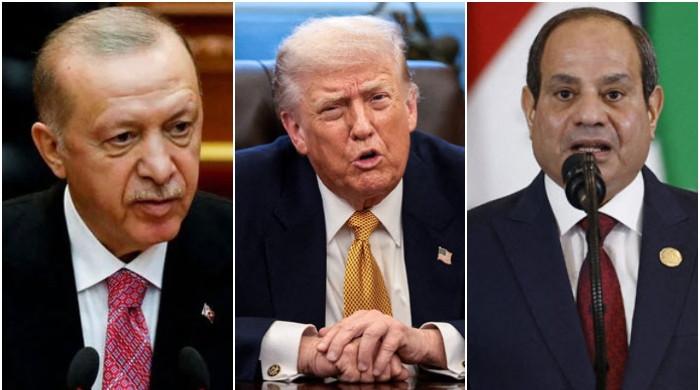
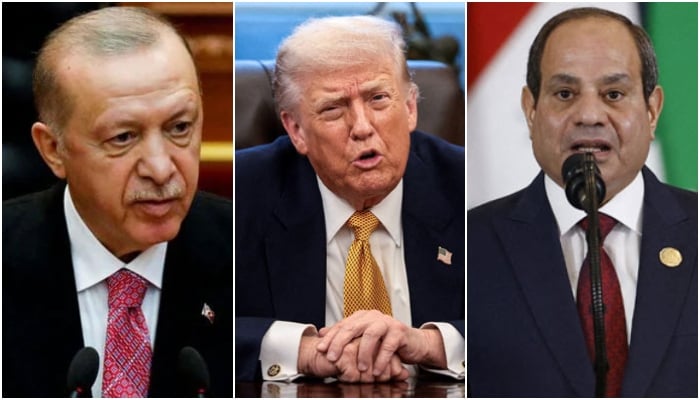
- Cairo “studying” request for Sisi to join board, says FM.
- Canadian PM intends to accept Trump’s invitation: aide.
- Argentine president says it will be an ‘honour’ to join initiative.
WASHINGTON: US President Donald Trump’s so-called “Board of Peace” for postwar Gaza began to take shape Saturday, with the leaders of Egypt, Turkey, Argentina and Canada asked to join.
The announcements from those leaders came after the US president named his Secretary of State Marco Rubio, former British prime minister Tony Blair, and senior negotiators Jared Kushner and Steve Witkoff to the panel.
Trump had already declared himself the chair of the body, as he promotes a controversial vision of economic development in the Palestinian territory, which lies in rubble after two-plus years of relentless Israeli bombardment.
The moves came after a Palestinian committee of technocrats meant to govern Gaza held its first meeting in Cairo which was attended by Kushner, Trump’s son-in-law who has partnered with Witkoff for months on the issue.
In Canada, a senior aide to Prime Minister Mark Carney said he intended to accept Trump’s invitation, while in Turkey, a spokesman for President Recep Tayyip Erdogan said he had been asked to become a “founding member” of the board.
Egypt’s Foreign Minister Badr Abdelatty said Cairo was “studying” a request for President Abdel Fattah al-Sisi to join.
Sharing an image of the invitation letter, Argentine President Javier Milei wrote on X that it would be “an honour” to participate in the initiative.
In a statement sent to AFP, Blair said: “I thank President Trump for his leadership in establishing the Board of Peace and am honoured to be appointed to its Executive Board.”
Blair is a controversial figure in the Middle East because of his role in the 2003 invasion of Iraq. Trump himself said last year that he wanted to make sure Blair was an “acceptable choice to everybody.”
Blair spent years focused on the Israeli-Palestinian issue as representative of the “Middle East Quartet” – the United Nations, European Union, United States and Russia – after leaving Downing Street in 2007.
The White House said the Board of Peace will take on issues such as “governance capacity-building, regional relations, reconstruction, investment attraction, large-scale funding and capital mobilisation.”
The other members of the board so far are World Bank President Ajay Banga, an Indian-born American businessman; billionaire US financier Marc Rowan; and Robert Gabriel, a loyal Trump aide who serves on the US National Security Council.
Trump has created a second “Gaza executive board” that appears designed to have a more advisory role.
It was not immediately clear which world leaders were asked to be on each board.
The White House, which said Friday that additional members would be named to both entities, did not immediately reply to a request for comment.
Israel strikes
Washington has said the Gaza plan had gone on to a second phase – from implementing the ceasefire to disarming Hamas, whose October 2023 attack on Israel prompted the massive Israeli offensive.
On Friday, Trump named US Major General Jasper Jeffers to head the International Stabilization Force, which will be tasked with providing security in Gaza and training a new police force to succeed Hamas.
Jeffers, from special operations in US Central Command, in late 2024 was put in charge of monitoring a ceasefire between Lebanon and Israel, which has continued periodic strikes aimed at Hezbollah.
Gaza native and former Palestinian Authority deputy minister Ali Shaath was earlier tapped to head the governing committee.
Trump, a real estate developer, has previously mused about turning devastated Gaza into a Riviera-style area of resorts, although he has backed away from calls to forcibly displace the population.
Politics
India slaps $2.45m fine on IndiGo for mass flight cancellations
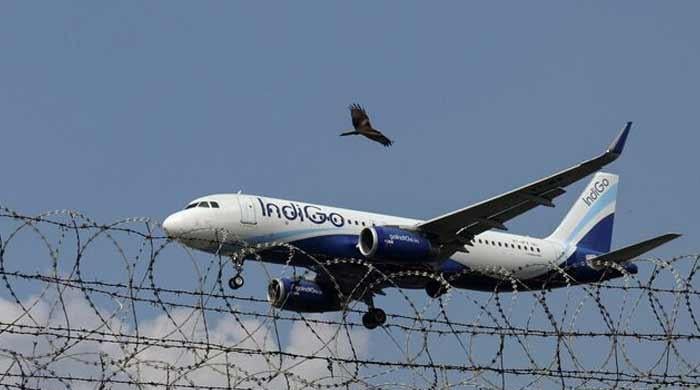
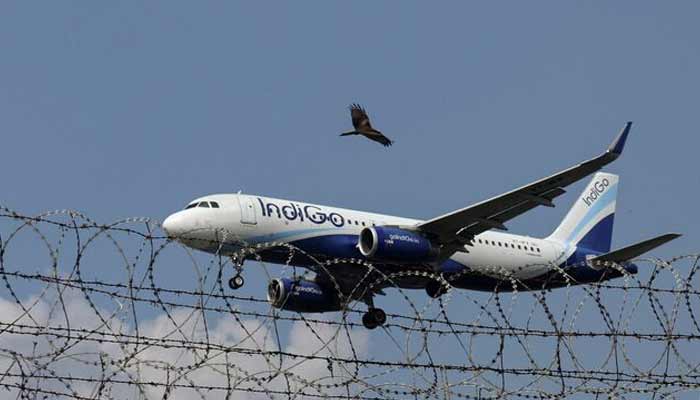
- Private carrier admits misjudgement, planning gaps.
- Regulator orders IndiGo to relieve senior office bearers.
- Operational meltdown linked to new policy of pilot rest.
India’s civil aviation regulator on Saturday imposed a fine of $2.45 million on IndiGo, the country’s biggest airline, for poor roster planning that led to large-scale flight cancellations in December.
Airports across India were thrown into disarray late last year, with the private carrier admitting “misjudgement and planning gaps” in adapting to a new policy of pilot rest.
Over 4,000 mostly domestic flights were either cancelled or delayed for over a week across the country, stranding hundreds of thousands of passengers.
The operational meltdown came even though IndiGo had two years to prepare for the new rules aimed at giving pilots more rest periods in between flights to enhance passenger safety.
The Directorate General of Civil Aviation (DGCA) said it was levying the penalty for several lapses, including “failure to strike (a) balance between commercial imperatives and crew members’ ability to work effectively”.
The regulator ordered IndiGo to relieve its senior vice president of its operations control centre of his responsibilities, according to a statement released on Saturday.
It also issued warnings to senior officials at the company, including CEO Pieter Elbers “for inadequate overall oversight of flight operations and crisis management”.
There was no immediate response from IndiGo to the fine.
IndiGo, which commands 60% of India’s domestic market, operates more than 2,000 flights a day.
The crisis was one of the biggest challenges faced by the no-frills airline that has built its reputation on punctuality.
India is one of the world’s fastest growing aviation markets. In November 2024, IndiGo reached a daily level of 500,000 passengers for the first time.
Politics
Protesters rally in Denmark and Greenland against Trump annexation threat
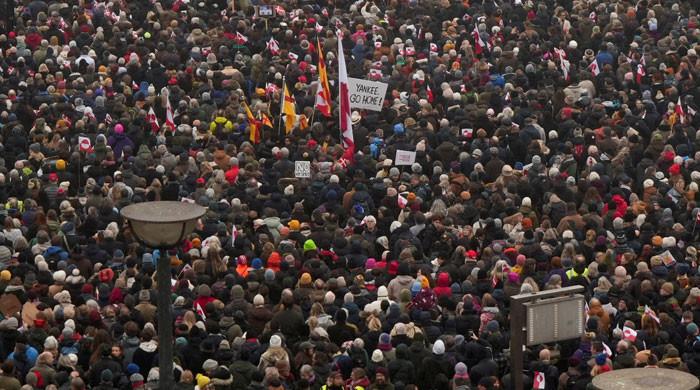
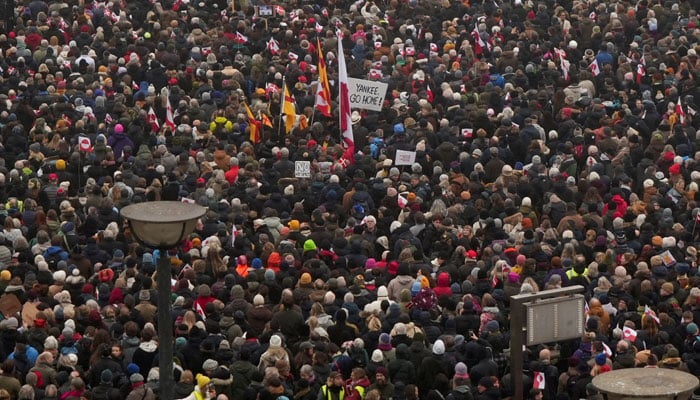
- Protesters chant, “Greenland is not for sale.”
- Over “20,000 people” attend protest in Copenhagen.
- Trump says Greenland vital to US security.
COPENHAGEN: Protesters in Denmark and Greenland demonstrated on Saturday against President Donald Trump’s demand that the Arctic island be ceded to the US and called for it to be left to determine its own future.
Trump says Greenland is vital to US security because of its strategic location and large mineraldeposits, and has not ruled out using force to take it. European nations this week sent military personnel to the island at Denmark’s request.
In Copenhagen, demonstrators chanted “Greenland is not for sale” and held up slogans such as “No means No” and “Hands off Greenland” alongside the territory’s red-and-white flag as they marched to the US embassy.
Some wore red baseball caps resembling the “Make America Great Again” caps of Trump supporters, but with the slogan “Make America Go Away”.

In Greenland’s capital Nuuk, hundreds of protesters led by Prime Minister Jens-Frederik Nielsen carried flags and similar banners as they headed for the US consulate.
They passed a newly built block where Washington plans to move its consulate – currently a red wooden building with four staff.
Organisers estimated over 20,000 people attended the protest in Copenhagen – akin to the entire population of Nuuk – though police did not provide an official figure. Other protests were held across Denmark.
“I am very grateful for the huge support we as Greenlanders receive … we are also sending a message to the world that you all must wake up,” said Julie Rademacher, chair of Uagut, an organisation for Greenlanders in Denmark.
Trump triggers diplomatic rift
Trump’s repeated statements about the island have triggered a diplomatic crisis between the US and Denmark, both founding members of the NATO military alliance, and have been widely condemned in Europe.
The territory of 57,000 people, governed for centuries from Copenhagen, has carved out significant autonomy since 1979 but remains part of Denmark, which controls defence and foreign policy, and funds much of the administration.
Some 17,000 Greenlanders live in Denmark, according to Danish authorities.
All five parties elected to Greenland’s parliament ultimately favour independence, but they disagree on the timing and have recently said they would rather remain part of Denmark than join the US
Only 17% of Americans approve of Trump’s efforts to acquire Greenland, and large majorities of Democrats and Republicans oppose using military force to annex it, a Reuters/Ipsos poll found. Trump called the poll “fake”.
-

 Tech5 days ago
Tech5 days agoNew Proposed Legislation Would Let Self-Driving Cars Operate in New York State
-

 Sports1 week ago
Sports1 week agoClock is ticking for Frank at Spurs, with dwindling evidence he deserves extra time
-
Sports1 week ago
Commanders go young, promote David Blough to be offensive coordinator
-

 Entertainment5 days ago
Entertainment5 days agoX (formerly Twitter) recovers after brief global outage affects thousands
-

 Fashion1 week ago
Fashion1 week agoSouth India cotton yarn gains but market unease over US tariff fears
-

 Fashion1 week ago
Fashion1 week agoChina’s central bank conducts $157-bn outright reverse repo operation
-

 Business1 week ago
Business1 week agoSoftBank reduces Ola Electric stake to 13.5% from 15.6% – The Times of India
-

 Sports1 week ago
Sports1 week agoUS figure skating power couple makes history with record breaking seventh national championship






